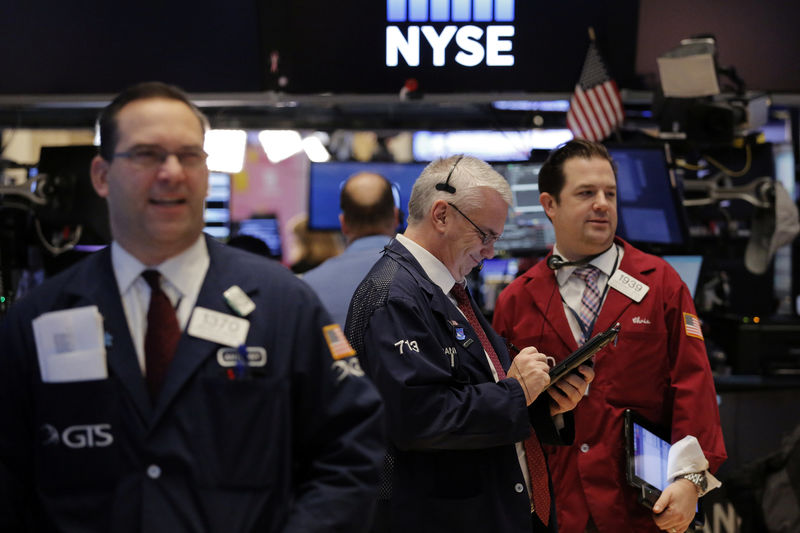By Caroline Valetkevitch
NEW YORK (Reuters) - U.S. stocks fell on Tuesday, with financials, transports and other big post-election gainers losing ground as earnings season kicked into gear.
Also weighing on stocks were concerns about protectionist trade policies planned by U.S. President-elect Donald Trump. The concerns pushed the dollar to its lowest in more than a month and bond yields down as investors cut risk.
The S&P 500 financial index (SPSY), which has rallied since the election on expectations of higher interest rates and reduced regulation under Trump, had its worst day since June 27 and led sector losses. It fell 2.3 percent.
Morgan Stanley (N:MS) shares slid 3.8 percent even after its profit doubled in the fourth quarter. The bank's finance chief, Jonathan Pruzan, said Morgan Stanley will not increase its quarterly target for the business until it is clear that recent revenue trends were sustainable.
"We continue to see a rally in the 10-year bond, so as we see that yield curve shift lower, that is a potential headwind for financials," said Bucky Hellwig, senior vice president at BB&T (NYSE:BBT) Wealth Management in Birmingham, Alabama.
"The flatter the yield curve, the less implicit net interest margin there is. How that plays out, I don't know if anybody knows ... but it's usually not a positive for the financials."
Biotech and pharma stocks declined after Trump said in a Washington Post interview he would target companies over drug pricing and that he was ready to unveil a plan to replace Obamacare. The Nasdaq biotech index (NBI) was down 2 percent.
The Dow Jones Industrial Average (DJI) ended down 58.96 points, or 0.3 percent, to 19,826.77, the S&P 500 (SPX) lost 6.75 points, or 0.3 percent, to 2,267.89 and the Nasdaq Composite (IXIC) dropped 35.39 points, or 0.63 percent, to 5,538.73.
U.S. stocks have mostly surged since Trump's election on bets that he would usher in an era of economic growth through fiscal stimulus.
"You're getting some give-back to the areas that have really done well with the Trump election. Some of that is a feeling he's starting to take on a lot of targets," said Rick Meckler, president of LibertyView Capital Management.
Worries over Trump's economic policies and the potential for U.S. policy errors rose sharply this month, according to a survey of fund managers.
Investors awaited more quarterly earnings reports from companies. Other major banks are due to report this week along with some transportation companies.
The Dow Transportation Average (DJT), which shot up after the Nov. 8 election, closed down 1.1 percent. Shares of railroad CSX (O:CSX) fell 3.4 percent after the bell following its results, while CSX ended the regular session down 1.8 percent.
Still, on the whole, S&P 500 companies are set to report their strongest profit growth in two years.
A 1.4-percent rise in consumer staples (SPLRCS) offset some of the losses in the regular session.
About 6.7 billion shares changed hands on U.S. exchanges, above the 6.3 billion daily average for the past 20 trading days.
Declining issues outnumbered advancing ones on the NYSE by a 1.23-to-1 ratio; on Nasdaq, a 2.41-to-1 ratio favored decliners.
The S&P 500 posted nine new 52-week highs and one new low; the Nasdaq recorded 57 new highs and 20 lows.
